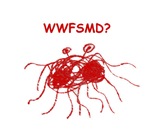Tuesday, March 23, 2004
Your Voice
The MoveOn Voter Fund have just released their first book; MoveOn’s 50 Ways to Love Your Country: How to Find Your Political Voice and Become a Catalyst for Change. Each of these, "50 Ways" were submitted by MoveOn members. It's available on the Internet or at your local bookstore and the $10 price tag will go toward the MoveOn.org grass roots efforts.
What follows is an introduction to one of the sections to the book written by Al Gore. This struck a chord with me because of recent correspondance I've had with Karl whose blog, paradox1x is very cool, especially the photo on his home page of the Philadelphia skyline. Karl shared a story of someone who doesn't appreciate the value of a single vote in the democratic process and how hard it is to make someone see that importance. I think the following Gore excerpt makes a good case for the importance of that vote...
Woody Allen has famously said that 90 percent of success is showing up. That’s true of democracy too. I’d argue that the other 10 is making sure you’re registered beforehand.
It’s easy to be cynical about politics and to believe that one vote barely matters. But consider these facts: John F. Kennedy’s 1960 victory over Richard Nixon—a victory that ultimately led to sweeping changes in civil rights laws, the first great wave of space exploration, and the creation of Medicare—was decided by just 100,000 votes nationwide. In 1994, the year Republicans won both houses of Congress, the redistribution of about 10,000 votes nationally would have kept Congress in Democratic hands. One of my former House colleagues, Connecticut Democrat Sam Gejdenson, won reelection by twenty-one votes that year. (“All you need is one,” he remarked; “the rest are for your ego.”)
The democratic political process isn’t perfect. Winston Churchill once said it’s the worst system for governance “except for every other system that has ever been tried.” Often, you may find no candidate who completely reflects your views. But as voter participation has declined—from nearly two-thirds of eligible voters in 1960 to less than half in many national elections today—strong and decidedly undemocratic forces have stepped in to fill the void.
In a democracy, the future isn’t something that just happens; it’s something we shape for ourselves, together. Special-interest lobbyists get the government they pay for only when we stay home from the polls—only when we abdicate the electoral power that is mightier than any soft-money check, more decisive than any million-dollar ad blitz or corporate misinformation campaign.
| Permalink Here

The MoveOn Voter Fund have just released their first book; MoveOn’s 50 Ways to Love Your Country: How to Find Your Political Voice and Become a Catalyst for Change. Each of these, "50 Ways" were submitted by MoveOn members. It's available on the Internet or at your local bookstore and the $10 price tag will go toward the MoveOn.org grass roots efforts.
What follows is an introduction to one of the sections to the book written by Al Gore. This struck a chord with me because of recent correspondance I've had with Karl whose blog, paradox1x is very cool, especially the photo on his home page of the Philadelphia skyline. Karl shared a story of someone who doesn't appreciate the value of a single vote in the democratic process and how hard it is to make someone see that importance. I think the following Gore excerpt makes a good case for the importance of that vote...
Woody Allen has famously said that 90 percent of success is showing up. That’s true of democracy too. I’d argue that the other 10 is making sure you’re registered beforehand.
It’s easy to be cynical about politics and to believe that one vote barely matters. But consider these facts: John F. Kennedy’s 1960 victory over Richard Nixon—a victory that ultimately led to sweeping changes in civil rights laws, the first great wave of space exploration, and the creation of Medicare—was decided by just 100,000 votes nationwide. In 1994, the year Republicans won both houses of Congress, the redistribution of about 10,000 votes nationally would have kept Congress in Democratic hands. One of my former House colleagues, Connecticut Democrat Sam Gejdenson, won reelection by twenty-one votes that year. (“All you need is one,” he remarked; “the rest are for your ego.”)
The democratic political process isn’t perfect. Winston Churchill once said it’s the worst system for governance “except for every other system that has ever been tried.” Often, you may find no candidate who completely reflects your views. But as voter participation has declined—from nearly two-thirds of eligible voters in 1960 to less than half in many national elections today—strong and decidedly undemocratic forces have stepped in to fill the void.
In a democracy, the future isn’t something that just happens; it’s something we shape for ourselves, together. Special-interest lobbyists get the government they pay for only when we stay home from the polls—only when we abdicate the electoral power that is mightier than any soft-money check, more decisive than any million-dollar ad blitz or corporate misinformation campaign.
| Permalink Here
http://www.top-blogs.com/cgi-bin/rankem.cgi?id=ebradlee

